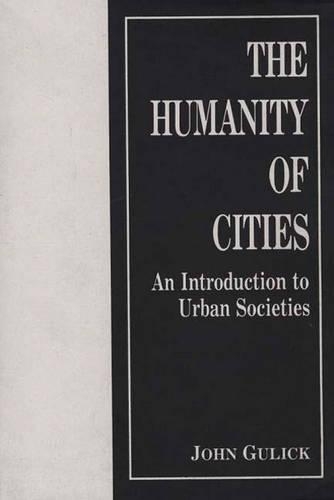
The Humanity of Cities: An Introduction to Urban Societies
(Paperback)
Publishing Details
The Humanity of Cities: An Introduction to Urban Societies
By (Author) John Gulick
Bloomsbury Publishing PLC
Praeger Publishers Inc
30th November 1988
United States
Classifications
Tertiary Education
Non Fiction
307.76
Physical Properties
Paperback
329
Description
I recommend this book highly to social scientists who are looking for a review or refresher course in urbanology, advanced undergraduate students, and introductory graduate students. As our American college student bodies become more culturally diverse, The Humanity of Cities provides a welcome respite from the usual culture-bound texts that give limited attention, for effect only, of the sterotypical `Third World'. Contemporary Sociology Gulick's style is to develop each topic by presenting appropriate case studies. He manages to include an enormous range of studies, and he wisely reaches out beyond anthropology to the many fields that concern themselves with urban life. This book is consequently an excellent compilation of the recent history of theoretical and empirical research on an in cities. The 28-page bibliography is itself a tour de force. American Anthropologist Combining major urban theories with empirical studies from around the world, the author offers poignant glimpses into urban life, including: the streets of San Francisco as seen through the eyes of a proud garbage collector; the marketplace of Ibadan, as seen by a petty food trader; the curiously empty streets of Fun city, a California retirement community; and Cairo's teeming cemetary, the City of the Dead, filling with the living. The problems of urban life are shown to be more a result of worldwide forces, rather than the intrinsic nature of cities. This major, new, and timely contribution to the field is a most useful way to introduce urban scholars, planners, and students in a variety of disciplines to The Humanity of Cities. A complete teachers' manual makes this the perfect text.
Reviews
In this introduction to urban sociology, it is argued that the concept of the inhumanity of cities--as contrasted with human settlements of other forms--is empirically and intellectually unsound, and that it is also a deterrent to peoples' constructive thought and action in urban everyday life. Humanity of cities represents a realistic and constructive base concept, while inhumanity of cities as a base concept is both the product of and the generator of destructive illusions. By no means, however, is any sort of utopian view of cities promulgated here. The agenda for concerned and involved people is to identify all the ways in which the humanity of cities is actually experienced, so that city dwellers may heighten their awareness of how to enhance the humanity of cities. Static utopia is not the goal, but instead well-informed, constant mobilization for improvement. Bureaucratic subcultures, which seem so often to ordinary people to be antagonistic and inhumane, are investigated here with a view to digging beneath their monolithic facades. Also discussed are grass-roots movements in which ordinary citizens mobilize themselves against bureaucratic and other powerful urban structures.-Sage
"In this introduction to urban sociology, it is argued that the concept of the inhumanity of cities--as contrasted with human settlements of other forms--is empirically and intellectually unsound, and that it is also a deterrent to peoples' constructive thought and action in urban everyday life. Humanity of cities represents a realistic and constructive base concept, while inhumanity of cities as a base concept is both the product of and the generator of destructive illusions. By no means, however, is any sort of utopian view of cities promulgated here. The agenda for concerned and involved people is to identify all the ways in which the humanity of cities is actually experienced, so that city dwellers may heighten their awareness of how to enhance the humanity of cities. Static utopia is not the goal, but instead well-informed, constant mobilization for improvement. Bureaucratic subcultures, which seem so often to ordinary people to be antagonistic and inhumane, are investigated here with a view to digging beneath their monolithic facades. Also discussed are grass-roots movements in which ordinary citizens mobilize themselves against bureaucratic and other powerful urban structures."-Sage
Author Bio
JOHN GULICK is Professor Emeritus of Anthropology at the University of North Carolina, Chapel Hill, and Fellow of the Carolina Population Center.
